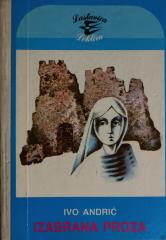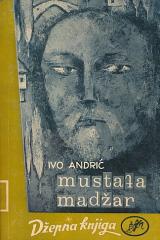Ivo Andrić
Ivo Andrić (9. Oktober 1892 – 13. März 1975) war ein kroatisch-bosnisch-serbischer Schriftsteller und der einzige Literaturnobelpreisträger aus dem ehemaligen Jugoslawien (1961). Er wurde in Travnik geboren und in Sarajevo, Zagreb, Wien und Krakau ausgebildet. Während des Ersten Weltkriegs war er aufgrund seiner Sympathie für die Einheit Jugoslawiens ein politischer Gefangener. Nach dem Krieg begann er eine diplomatische Karriere und arbeitete in verschiedenen europäischen Hauptstädten.
Andrić ist vor allem für seine Romane und Kurzgeschichten bekannt, die sich mit der Geschichte und dem Schicksal Bosniens und seiner Bevölkerung befassen und oft im osmanischen und österreichisch-ungarischen Kontext angesiedelt sind. Seine bekanntesten Werke sind „Die Brücke über die Drina“, „Die Chronik von Travnik“ und „Die Dame“, die zusammen eine Art Trilogie über die bosnische Geschichte und Mentalität bilden. Für „Die Brücke über die Drina“, einen epischen Roman über die jahrhundertealte Geschichte der Stadt Višegrad und ihrer Brücke, erhielt er den Nobelpreis.
Sein Stil ist ruhig reflektierend, historisch informiert und zutiefst humanistisch, und seine Themen sind oft geprägt von der Betrachtung des Bösen, des Schicksals, des Leidens und der historischen Zyklen.
Andrić hinterließ ein reiches Werk an Essays, Kurzgeschichten und Romanen und sein Werk nimmt in der Literatur Südosteuropas nach wie vor einen wichtigen Platz ein.
Titel im Angebot
Dvije priče: Priča o kmetu Simanu / Bife "Titanik"
Ispovijed i druge priče
The collection "Confession and Other Stories" brings together lesser-known, but extremely valuable, short stories by Andrić, written mainly in the period 1920–1940, some of which were only published posthumously.
Izabrana proza
Knjiga, kula, deca
Ljubav u kasabi
In the story "Love in a Town" (1926), Andrić weaves a story about two young people whose love was like a river flowing under the ice – strong, but trapped, in a town where dreams break against the stone of tradition.
Mustafa Madžar i druge priče
The short story Mustafa Madžar describes the life of Mustafa Madžar, a hero from Doboj who fought against the Austrians.
Na Drini ćuprija
Ivo Andrić's novel, published in 1945, is a masterpiece of world literature and winner of the Nobel Prize in 1961. Set in Višegrad, the story follows the history of the bridge over the Drina River from the 16th to the 20th centuries, built by Mehmed-paša
Na Drini ćuprija
Ivo Andrić's novel, published in 1945, is a masterpiece of world literature and winner of the Nobel Prize in 1961. Set in Višegrad, the story follows the history of the bridge over the Drina River from the 16th to the 20th centuries, built by Mehmed-paša
Priča o vezirovom slonu
In this Andrić masterpiece, you open the door to a world where power meets wonder, and fear intertwines with hope! If you like deep emotions, the mysticism of the Orient and the strength of the people, The Story of the Vizier's Elephant is waiting for you









